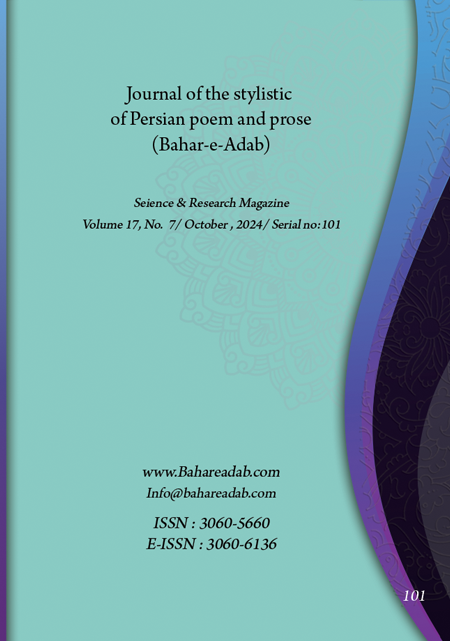- Count View : 445
- آدرس کوتاه شده مقاله: https://bahareadab.com/article_id/1740
- کد DOI مقاله: DOI:10.22034/bahareadab.2024 .17 .7659
Journal of the stylistic of Persian poem and prose
volume Number 17،
number In Volume 7،
،
issue Number 101
An introduction to the manuscript of the 7th century Quran translation attributed to Saadi and research on rejecting this attribution
Burhan Ahmed , Abdul Reza Seif (Author in Charge), Homira Zomoorrodi
Abstract
BACKGROUND AND OBJECTIVES: After the arrival of Islam in the land of Iran, a number of virtuous Iranians translated the Qur"an into Persian until the tradition of translating the Qur"an continued for centuries in the land of Iran and its neighboring countries. Some of these translations of the Qur"an, which are sometimes exquisite and precious, are kept in different libraries of the world today, which need to be introduced and corrected by copyists and proofreaders. One of these translations is the translation of the Qur"an preserved in the Ganj Bakhsh Library of Pakistan. This version is registered in this library with the number 11559.
METHODOLOGY: The method of gathering the contents of this article is based on the sources and findings of a library, and a descriptive analytical method was used in its writing.
FINDINGS: The translation in this article It was introduced and apparently belongs to the 7th century of Hijri. Its author is mentioned in several places with different names. In the leaves of this edition, the name of the translator of Mosleh al-Din Sheikh Saadi Shirazi, a famous poet of the 7th century of Hijri, is explicitly written. This translation includes all the surahs of the Quran. In this article, an attempt has been made to examine the features of this version, including the age of the version, the spelling of the version, vocabulary and grammatical features. Also, the relation of this translation to Saadi Shirazi has been evaluated.
CONCLUSION: With a close look at this translation of the Qur"an attributed to Sheikh Saadi Shirazi, it was determined that the attribution of this work to Saadi Bana is far from reasonable and does not have much scientific support. Also, the name of the author or possible authors of this work was also checked. In the first possibility, it was said that the authors of the version were two people named Fazl Heravi and Fazl Farahi. In another possibility, it was stated that probably the name of both scribes was the same person, Fazl Heravi. In the third possibility, it was stated that the writing of the entire current version, which probably dates back to the 11th century, was done by Hossein bin Yahya Ajmi. It was also found that this translation was not immune to errors and in some cases the translator made mistakes in his translation. In addition, it became clear that the scribe of the copy also made mistakes in some cases and due to his lack of mastery of the Persian language, he made mistakes in his copying. On the other hand, in this article, the linguistic and grammatical features of the work, calligraphy and spelling of the version are also discussed.
Keyword
translation of the Qur'an
, revision
, Saadi
, manuscript research
- Azarnoosh, Azartash (1996). The history of the translation of the Qur’an. Tehran: Soroush.
- Bashri, Javad (2019). "Page 18: Two 5th century manuscripts in Eastern Kufic script in Pakistan”. The mirror of research. Year 31. April and May. Number 181.pp. 225-254.
- Bashri, Javad (2020), Page 18: Two 5th-century manuscripts in Eastern Kufic script in Pakistan, Ayane Research, No. 181, April and May 399, pp. 227-233.
- Bahar, Mohammad Taqi (2007), Typology, Tehran: Amir Kabir.
- Old translation of the Holy Quran; Manuscript No. 11559
- Pars Museum Quran translation (1976), by an unknown translator, by Ali Rawaqi, Tehran: Farhang Iran Foundation.
- Tafsir Qur'an Cambridge (1970), corrected by Jalal Matini, Tehran: Farhang Iran Foundation.
- Tafsir Quran Pak (1969) to Ali Rawaqi's effort, Tehran: Farhang Iran Foundation.
- Commentary on Ushari from the Holy Qur'an (1973), corrected by Jalal Matini, Tehran: Farhang Iran Foundation.
- Ranjha, Mohammad Nazir (1993). List of manuscripts of the Holy Quran. Islamabad: Persian Research Center of Iran and Pakistan.
- Munzavi, Ahmad (1998), Joint List of Persian Manuscripts of Pakistan, Islamabad, Persian Research Center of Iran and Pakistan.
- Noshahi, Arif (2013), Old leaves of the Persian translation of the Holy Qur'an (Shirani version), antique papers by Sayyed Mohammad Hossein Hakim, Tehran: Library, Museum and Documents Center of the Islamic Council, vol. 3, pp. 53-83.
- Yahagi, Mohammad Jafar and colleagues (1993), Quranic Dictionary, Mashhad: Astan Quds Razavi Research Foundation.

